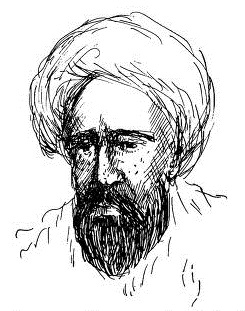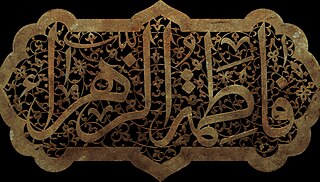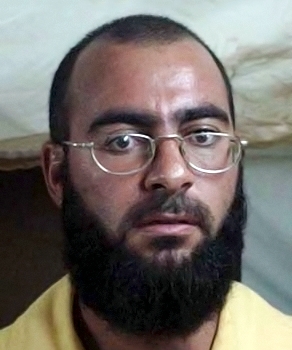Related Research Articles

Abd Allah ibn Abi Quhafa, commonly known by the kunyaAbu Bakr, was the first caliph, ruling from 632 until his death in 634. A close companion and father-in-law of Muhammad, Abu Bakr is referred to with the honorific title al-Ṣiddīq by Sunni Muslims.
Muhammad bin Ahmed bin Juzayy Al Gharnati, better known as Ibn Juzayy was an Andalusian Sunni Muslim scholar of Arab origin. He was a distinguished Maliki jurist, legal theoretician, Quran commentator, Quran reciter, hadith scholar, historian, scholar in Arabic, poet, preacher, orator, and a literary figure. He achieved notoriety at a young age, known as a major scholar of his day. He is famed for authoring classical works and for achieving martyrdom during his jihad against the Spanish Christian crusade.
Muhsin ibn Ali, also spelled Mohsin, was the youngest son of Fatima bint Muhammad and Ali ibn Abi Talib, and thus a maternal grandson of the Islamic prophet Muhammad. He was a brother of Husayn and Hasan. Controversy surrounds the fate of Muhsin as some canonical Shia sources report that Muhsin died in miscarriage, following a raid on her house led by Umar, a companion of Muhammad. Alternatively, Sunnis hold that Muhsin died in infancy of natural causes.
The Saqifa of the Banu Sa'ida clan refers to the location of an event in early Islam where some of the companions of the Islamic prophet Muhammad pledged their allegiance to Abu Bakr as the first caliph and successor to Muhammad shortly after his death in 11 AH. The Saqifa meeting is among the most controversial events in early Islam, due to the exclusion of a large number of Muhammad's companions, including his immediate family and notably Ali, his cousin and son-in-law. The conflicts that arose soon after Muhammad's death are considered to be the main cause of the current division among Muslims. Those who accepted Abu Bakr's caliphate were later labeled Sunnis, while the supporters of Ali's right to caliphate were later labeled Shia.

Al-Walīd ibn Ubaidillah Al-Buḥturī was an Arab poet born at Manbij in Islamic Syria, between Aleppo and the Euphrates. Like Abū Tammām, he was of the tribe of Tayy, from the Buhturids.
The issue of succession following the death of the Islamic prophet Muhammad is the central issue in the schisms that divided the early Muslim community in the first century of Islamic history into numerous schools and branches. The two most prominent branches that emerged from these divisions are Sunni and Shia branches of Islam. Sunni Islam asserts that Abu Bakr rightfully succeeded Muhammad through a process of election. In contrast, Shia Islam maintains that Ali ibn Abi Talib was Muhammad's designated successor.

'Abdallah ibn 'Alawi al-Haddad was a Yemeni Islamic scholar. He lived his entire life in the town of Tarim in Yemen's Valley of Hadhramawt and died there in 1720 CE. He was an adherent to the Ash'ari Sunni Creed of Faith (Aqidah), while in Islamic jurisprudence (Fiqh), he was a Sunni Muslim of Shafi'i school.
A kunya is a teknonym in an Arabic name, the name of an adult derived from their eldest son. A kunya is used as a component of an Arabic name, a type of epithet. Literally it refers to the bearer's first-born son or daughter, and this is the usual case. But it may instead have hypothetical or metaphorical references: an example would be Abu Hurayra, “father of the kitten”, the invariable name used for one of the Companions of Muhammad who was known for his pet cat.

Abū Bakr is an Arabic given name meaning "Father of a Young Camel" that is widely used by Sunni Muslims.
According to Shi'a scholars, Fatima Zahra was Muhammad's only daughter. The Sunni belief that he had other daughters by Khadijah denies Ali ibn Abu Talib the distinction of being Muhammad's only son-in-law. She is held in highest of esteem, as being the single most ideal example for all women; in terms of her purity and the eventual martyrdom of her son, she is considered to be the Muslim counterpart to the Christian Mary, mother of Jesus; indeed, one of her names is Maryam al-Kubrá, or "the greater Mary".

The attack on Fatima's house refers to a disputed violent attack on the house of Fatima, daughter of the Islamic prophet Muhammad. The attack is said to have taken place shortly after the death of Muhammad in 11 AH and was instigated by his successor Abu Bakr and led by Umar, another companion. The purpose of the attack was to arrest Fatima's husband Ali, who had withheld his pledge of allegiance to Abu Bakr. Her injuries during the raid might have caused the young Fatima's miscarriage and death within six months of Muhammad.

Fatima bint Muhammad, commonly known as Fatima al-Zahra', was the daughter of the Islamic prophet Muhammad and his wife Khadija. Fatima's husband was Ali, the fourth of the Rashidun Caliphs and the first Shia Imam. Fatima's sons were Hasan and Husayn, the second and third Shia Imams, respectively. Fatima has been compared to Mary, mother of Jesus, especially in Shia Islam. Muhammad is said to have regarded her as the best of women and the dearest person to him. She is often viewed as an ultimate archetype for Muslim women and an example of compassion, generosity, and enduring suffering. It is through Fatima that Muhammad's family line has survived to this date. Her name and her epithets remain popular choices for Muslim girls.
Radanfah Abu Bakr is a Trinidadian professional footballer who plays as a defender.
Gamil Abu Bakr Ratib was an Egyptian actor. He appeared in television and film productions and briefly in theater over a 65-year career. He was known for numerous villainous roles and his appearance in the English-language epic historical drama film Lawrence of Arabia.
Mohamed Mustapha Ali Masfaka, better known as Abu Ratib, is a Syrian Nasheed singer of Islamic and Arabic music based on classical Arab poetry.

Ibrahim Awad Ibrahim Ali al-Badri, commonly known by his nom de guerreAbu Bakr al-Baghdadi, was an Iraqi militant and leader of the Islamic State (IS) who served as its first self-declared caliph from 2014 until his death in 2019.
Nazhūn bint al-Qulāʽiya al-Gharnātiya was a Granadan Qiyan and poet, noted for her outrageous verse.

Abu Bakr Rabee Ibn Ahmad Al-Akhawayni Bokhari He had been a Persian physician and surgeon the author of the Hidayat al-Muta`allemin Fi al-Tibb, the oldest document in the history of Iranian Traditional Medicine (ITM). He lived during the Golden Age of Iranian-Islamic medicine and his book was used as a reference text for medical students long after his death. Al-Akhawayni Bokhari wrote about anatomy, physiology, pathology, pharmacology, signs, symptoms, treatment of the disease and surgery of tumors, urine stones, eyes, knee, bones, ... his time. His reputation was based on the treatment of patients with mental illnesses.
Al-Jaṣṣās was a Hanafite scholar, mostly known as the commentator of Al-Ḫaṣṣāf's work on Qādī (jurisprudence). According to Tillier (2009:281), the original work and its commentary can now "hardly be separated: al-Khaṣṣāf's original text is included in al-Jaṣṣāṣ's commentary". Al-Jaṣṣās is also the author of a work on tafsir, Aḥkām al-Qur'ān.
Rateb or Ratib may refer to:
References
- ↑ Evans, Hilary; Gjerde, Arild; Heijmans, Jeroen; Mallon, Bill; et al. "Abu Bakr Ratib". Olympics at Sports-Reference.com. Sports Reference LLC. Archived from the original on 3 December 2016. Retrieved 23 March 2010.